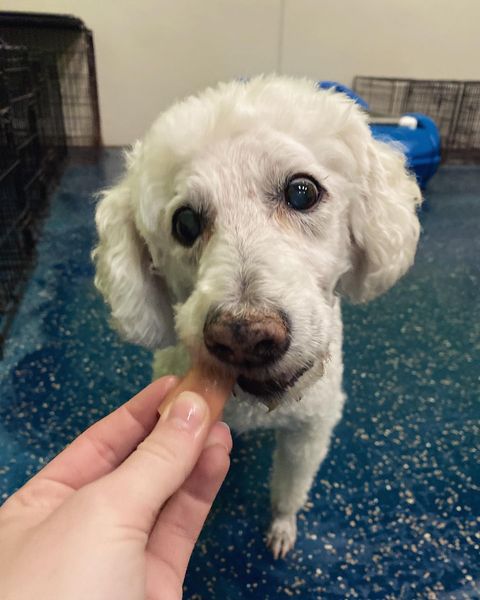Hotdogs are one of the most popular snacks in America. Whether it is the grilling season during summer or watching a baseball game in the park, hotdogs are consumed by billions of Americans every year. But is it safe to share it with our beloved pooch?
No, it is not highly recommended that you feed your dog hotdogs because these are highly processed foods containing many additives and preservatives. While an occasional treat may be acceptable, regularly feeding dogs with hotdogs will cause irreparable damage to their health in the long run.
Hotdogs are also somewhat of mystery meat. It has a number of ingredients that you might not recognize, and some may even astound you. In this article, we will look into why hotdogs are not an ideal addition to your dog’s diet and the number of alternative treats you can give your dog.
Can Dogs Eat Hotdogs?

No, the two main reasons why hotdogs should not be eaten by your dog regularly are the high salt content and the use of sodium nitrate as a curing ingredient.
Hotdogs are mostly made from pork, beef, or poultry trimmings that are grounded and mixed with a number of seasonings, spices, and curing ingredients.
Salt
It is found that a piece of a hotdog contains as much as 500 mg of salt. An average medium-sized dog of around 30 lbs requires only 200 mg of salt intake per day. Thus, ingesting a whole piece of hotdog can cause considerable damage to its health.
Though salt, or sodium chloride, is essential in our dog’s health because it regulates blood pressure as well as the water and mineral levels in the body. Salt also conducts nerve impulses and plays a major role in contracting and relaxing the muscles.
However, excessive consumption of salt has the same effect on humans and dogs. It can lead to high blood pressure, strokes, and heart problems. Calcium levels can also be affected because too much salt can draw out the minerals from the bone.
Plus, too much salt can cause salt poisoning, or hypernatremia, in dogs. This condition is characterized by vomiting, diarrhea, excessive urination, seizures, and muscle stiffness due to dehydration.
Sodium Nitrate
Sodium nitrate, or its relative sodium nitrite, is usually used as a preservative in cured meats, like hotdogs. It is the ingredient that gives the hotdog its pinkish color. Without it, the hotdog would come out grayish.
Sodium nitrate also protects the product from certain bacteria, like Clostridium botulinum. This bacteria is the cause of botulism that can induce respiratory and muscular paralysis.
When sodium nitrate is digested in your dog’s stomach, it is converted into nitrosamines which can result in cancer if given in excessive amounts. Other symptoms of nitrate toxicity include weakness, muscle incoordination, bluish mucous membranes, and collapse.
Moreover, excessive consumption of sodium nitrate can also cause methemoglobinemia, characterized by a brownish coloring of the blood due to the presence of iron. This is a type of anemia when iron oxygenation occurs, thereby preventing the blood from carrying oxygen to different parts of the body.
Can You Feed Raw Hotdogs To Dogs?
No, you should never feed your dogs, especially young puppies, raw hotdogs. It is a myth that because hotdogs are pre-cooked, they are safe to give to your dogs raw.
During processing and packaging, it is possible that raw hotdogs can be contaminated with certain bacteria, like Listeria monocytogenes. The bacteria can cause vomiting, diarrhea, and fever.
Are Hotdogs Harmful To Dogs?

Yes, it’s because of the other ingredients that are not suitable for dogs. These are internal organs, artificial casings, MSG, other flavorings, and antibiotics.
Internal Organs
Some hotdog manufacturers add internal organs like the heart, liver, and tongue. Additionally, it is most likely that meat fillers or finely textured lean beef colloquially termed as “pink slime” are also added.
These ingredients have very high-fat content, resulting in obesity if given in large amounts.
Artificial Casings
Artificial casings that are made from collagen or cellulose that may contain some chemicals can be hard for some dogs to digest. Some of them are thicker than the natural casings made from lamb intestines and may cause some problems if not chewed properly.
Monosodium Glutamate (MSG)
MSG is also present in most hotdogs. Excessive amounts cause seizures since glutamates are excitatory neurotransmitters in the brain. Studies also suggest that it is toxic to the liver, thymus, and kidneys.
Seasonings And Flavorings
Hotdogs wouldn’t be as delicious without the added layers of flavorings. However, our dogs’ systems are not compatible with these additional ingredients. Artificial flavorings and colorings can be linked to some allergies and cancer in our dogs.
Garlic and onion powders are used as flavorings in some hotdogs. These two food flavorings are considered highly toxic to dogs, whether in powder form or otherwise. They have bioactive compounds that can cause oxidative damage to the blood resulting in anemia.
Then, there’s also celery powder, an ingredient used as a curing agent which has the same effect as nitrites.
Antibiotics
Some meats in the hotdog may also be sourced from animals that were treated with antibiotics. Ingesting excessive amounts of antibiotics can cause gastrointestinal problems and liver, kidney, and neurological disorders.
What Do I Do If My Dog Eats Hotdogs?
If you see signs of salt poisoning in your dog, it is best to bring this to your veterinarian’s immediate attention. You can also give your dog lots of clean drinking water to flush out the excess salt in its system.
For severe cases, hospitalization may be required to monitor the balance of electrolytes continuously. Intravenous fluids may be administered, and medications are given to support the proper functioning of the organs.
But, if your dog consumed just a small amount of hotdogs, then it would probably cause not much harm other than a mild case of diarrhea or stomach ache that should easily pass in a short time.

Can You Use Hotdogs As Training Treats?
Though we do not highly recommend it, yes, hotdogs can be given as an occasional treat but with some caution.
It is better to use the low-sodium variety if you really want to do this. There are also hotdogs that are made from whole meats, making them a less fatty alternative.
Also, it is best to cut the hotdogs into small pieces to prevent choking and to cook them thoroughly to kill any bacteria.
As an alternative during a barbecue party, it is more advisable to give your dog plain beef, chicken, or pork with no added salt or seasonings. There are alternative dog treats with the right amount of protein that can be safer to give to your dog.






